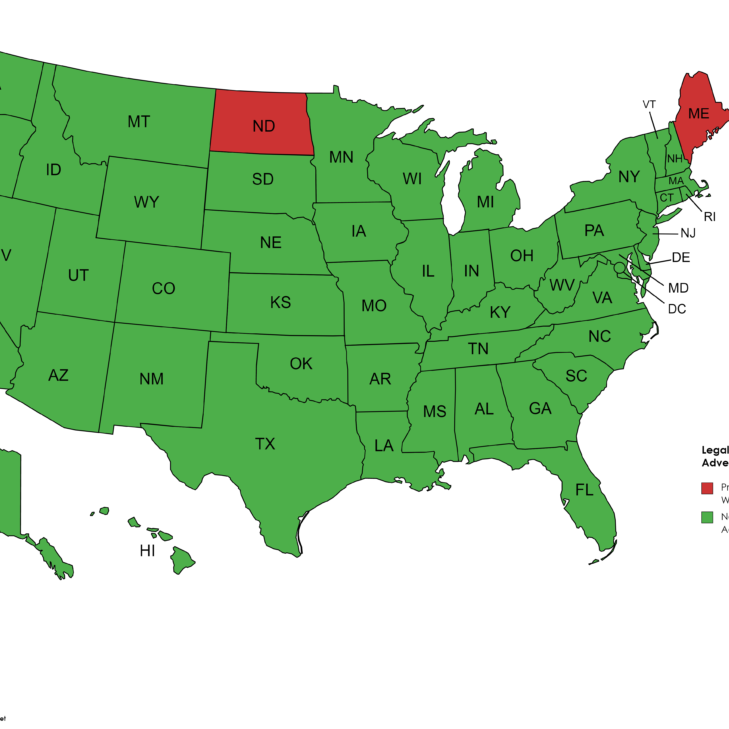Insights < BACK TO ALL INSIGHTS
Legality of an All-Encompassing U.S. Sports Betting Advertising Strategy
Legality of an All-Encompassing U.S. Sports Betting Advertising Strategy
By: Sara Dalsheim
As the legality of online sports wagering grows, so too does the level of advertising for such activities across the United States. The biggest commodity for sports wagering operators is their market share, gained through growing a loyal customer base of wagers who continue to place wagers on their platform. In order to increase their customer base, sports wagering operators are turning to advertisements of all sorts including traditional TV and radio advertisements. As of February 2022, gambling-related advertisements were about 1% of the total TV ad market. Data shows that just from September 2021 through May 2022, sports wagering operators in the U.S. spent an estimated $282 million on TV advertisements; and, according to an iSpot.TV report released this month, advertising has generated more than 18 billion impressions.
Today, 30 states and Washington, D.C. have legalized sports wagering with 20 of those states offering legal mobile sports wagering. Naturally the amount of gambling related advertisements in those jurisdictions is rampant. Currently, there are also many other states in the works to legalize sports wagering. Given the diversity in legality amongst states, advertisers should continue to be mindful of the legal status of sports wagering in specific jurisdictions. There are several multi-state marketing regions where sports wagering is legal in some or one of the states but not all of them. For this reason, a one-size fits all approach to sports wagering advertising is ill advised even in commonly advertised multi-state regions. Advertisers should take a conservative approach to all sports wagering advertising.
Given the speed at which sports wagering is being legalized throughout the country, when is to too early for the sports wagering operators to notify customers of their platform? It is likely never too early, but the operators and their marketing affiliates should be mindful of states’ advertising laws related to gambling and adjust their current and future marketing advertisement campaigns accordingly.
Most states where sports betting is illegal only prohibit encouraging or promoting these activities to take place within their state. These states do not outright prohibit overall gambling advertisements. It is generally thought that as long as advertisements do not promote the activities to be conducted within that particular state and the advertisement makes it clear that this promotion is void where prohibited or otherwise makes it evident where conduct on their platform is permitted then it can run in that state.
A couple of states’ laws do, however, proscribe that wagering advertising of any kind is prohibited. Maine prohibits gambling including activities related to out-of-state gambling.[1] Advertisers in Maine are not able to assert as a defense that the activity is solely taking placing outside of Maine, such promotions would still be considered violations of Maine’s gambling laws if it “intentionally or knowingly advances or profits from unlawful gambling activity.”[2] However, the bill legalizing sports wagering in Maine went into effect on July 31, 2022. Other sorts of gambling (i.e., iGaming), are illegal in the state and it remains illegal to advertise such conduct regardless of where they take place.
In North Dakota it is illegal to “sell, purchase, receive, or transfer a chance to participate in a lottery” regardless of “whether the lottery is … lawful in the other state or country”.[3] From the outset this prohibition does not seem applicable to sports wagering advertisements; however, North Dakota defines the term “lottery” very broadly. Under the North Dakota criminal code, a “lottery” means “any plan for the distribution of a thing of value, whether tangible or intangible, to a person or persons selected by chance from among participants, some or all of whom have given consideration for the chance of being selected.”[4] In other words, in North Dakota, if someone pays to enter a contest where the winner is determined by chance, then any scheme to distribute a thing of value to that winner is a lottery. The North Dakota Supreme Court has even held that a pinball gaming machine was a lottery under the law because players “pay a valuable consideration for entertainment and an opportunity dependent chiefly upon chance to win a prize or award”.[5] For these reasons, sports betting likely falls under the category of a lottery and it would be considered a violation of the North Dakota criminal code to advertise sports betting in the state regardless of if it is permissible elsewhere.
Surprisingly, the most restrictive state on wagering related activities, Utah, does permit wagering related advertisements so long as “the advertisement or solicitation contains or includes the words ‘Void in Utah’ conspicuously”.[6]
The majority of states that have not yet legalized sports wagering do not explicitly state whether such advertisements are violations of their state law. However, without any authority outright stating that general sports or other types of wagering platform advertisements are unlawful the Utah law is a good source on how advertisements could be executed in these states without running afoul. Simply stating that the conduct or platform is void in the state will allow platform operators to advertise their brands to the public in the hopes of being the first ones that come to mind when sports wagering does make its way to that state; and, given the rate at which states around the country are pushing toward legalization of sports wagering it is possible to see legal sports wagering throughout most of the country in the coming years. Why not start getting the word out about your brand now and work on building up the golden commodity that is a loyal customer base?
[1] See 17-A M.R.S.A. § 957.
[2] 17-A M.R.S.A. § 954.
[3] NDCC § 12.1-28-02(2)(a).
[4] NDCC § 12.1-28-01(4).
[5] Middlemas v. Strutz, 299 N.W. 589, 592 (N.D. 1941).
[6] U.C.A. 1953 § 76-10-1104.5(2).
[6] U.C.A. 1953 § 76-10-1104.5(2).





